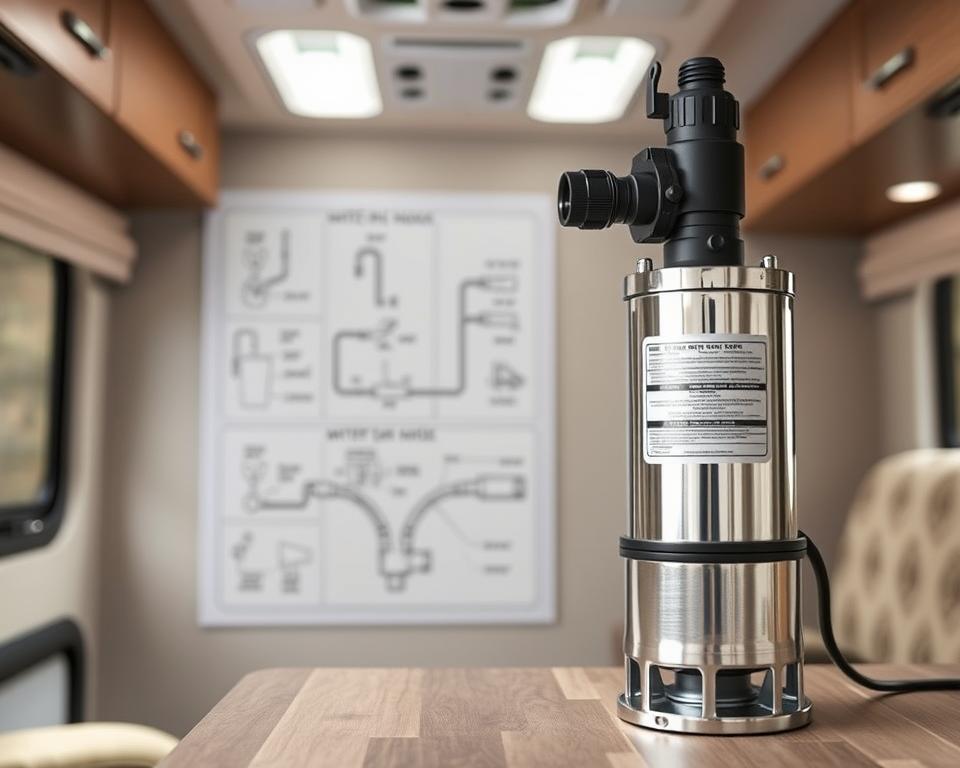RV Septic Tank Pumping – Comprehensive Guide
Have you reflected on the fall-out of overlooking your trailer’s septic system? If you travel with an RV or mobile rig, it’s vital to comprehend the necessity of RV septic Tank Pumping. It maintains your travels are smooth and living conditions are kept sanitary while on the move. By stressing regular trailer septic tank pumping, this guide strives to make you ready in maintaining your septic system, preventing potential problems – particularly while soaking up the great outdoors.
Here, thorough instruction into selecting solid mobile septic services is offered. Plus, you’ll see to spot when your septic Tank needs prompt attention. Grasping the process for efficient RV septic Tank Pumping is explained too. Instead of scrambling to issues as they surface, allow this guide to arm you with must-have knowledge. This ensures your RV experiences keep free of concern!
The Significance of Regular RV Septic Tank Pumping
Routine maintenance of your trailer’s septic Tank is crucial for its wastewater system’s functionality. Ignoring this can lead to clogs and backups, wrecking your enjoyment and damaging the environment. Sewage leaks from an over-filled Tank can taint the area, posing major concerns.
Hiring professional Pumping services like All in Sanitation makes sense for RV owners. This decision avoids issues and extends your system’s functionality and longevity. Timely Pump-outs translate to a safer, safer environment in RV parks and campgrounds.
Understanding Your Trailer’s Septic System
A trailer septic system features three primary elements: the black water Tank, grey water Tank, and fresh water Tank. For RV owners, it’s essential to know these parts. They are integral in waste management. The black water Tank holds toilet sewage, and the grey water Tank retains water from sinks and showers.
Each Tank has a separate role in keeping the trailer sanitary and operational. Monitoring the levels in the black water and grey water Tanks is critical. It helps avoid overflows, bad smells, and damage to the septic system.
To illustrate, below is a table that highlights differences between the black water and grey water Tanks:
| Feature | Black Water Tank | Grey Water Tank |
|---|---|---|
| Purpose | Keeps sewage waste | Collects wastewater from sinks and showers |
| Maintenance Frequency | Requires regular Pumping | Needs infrequent emptying |
| Potential Issues | Odors, blockages from solids | Risk of grease buildup |
| Typical Size | Generally bigger than grey water Tank | Smaller than black water Tank typically |
Knowing your RV’s septic system is the bedrock for maintenance. It guarantees pleasant travel experiences. Staying mindful of both Tanks equals trips with minimal septic concerns.

Indicators Your Septic Tank Needs Pumping
It’s essential to notice when your septic Tank needs Pumping to keep your system functional. Detecting issues early can sidestep major repairs and environmental harm. Common signs that call for attention include:
- Slow draining sinks, which may signal a full Tank or clog.
- Gurgling toilets, indicating blocked pipes or a failing septic system.
- Foul odors around your RV, an early warning of rising sewage.
- Pooling water near the drain field, showing that your Tank may be overwhelmed.
- Sewage backups in your toilets or drains, a definite sign immediate action is needed.
Becoming aware of these signs allows RV owners to act swiftly, heading off grave issues. Monitoring your system and reacting to these indicators can lengthen your septic system’s lifespan. This approach leads to a more enjoyable trailer experience.
What Determines Pumping Frequency
A septic Tank’s volume directly determines how often it requires Pumping. Larger Tanks demand more spread-out service because they contain more waste, while smaller Tanks demand more frequent Pumping.
The number of RVs using the septic system also influences Pumping frequency. With more RVs, the system experiences heavier strain, necessitating accelerated Pumping. Particularly in peak seasons, altering the schedule is vital to avoid problems.
Here is a table that outlines recommended Pumping intervals based on typical scenarios:
| Septic Tank Size | Number of RVs | Recommended Pumping Frequency |
|---|---|---|
| 500 gallons | 1-2 RVs | About every 2-3 years |
| 1000 gallons | 2-4 RVs | Every 3-5 years |
| 1500 gallons | 4+ RVs | As often as 1-2 years |
Thoughtfully setting your septic Tank’s Pumping frequency enhances its operation. It also extends its life and effectiveness. This decision is key for maintaining system health.
How to Choose a Reliable Septic Pumping Service
Selecting a trustworthy septic Pumping service is essential for your trailer’s septic system health. It guarantees swift and efficient Pumping, avoiding pricey future repairs. When shopping for a septic service provider, focus on these key aspects:
- Experience: Look for companies with a solid track record. Their experience with various septic systems, especially those for trailers, is paramount.
- Customer Reviews: Explore online reviews and testimonials. Glowing feedback and strong ratings are indicators of a dependable provider.
- Response Time: Fast response times showcase a company’s commitment to their customers and ability to meet their needs efficiently.
- Knowledge of Systems: Specialized knowledge of RV septic systems elevates some services. Providers like All in Sanitation know these systems well, enabling specialized service.
Emphasize these considerations to find the most appropriate service for your septic requirements. A dependable septic Pumping service boosts your system’s life and performance, allowing for carefree travel adventures.
RV Septic Tank Pumping: Step-by-Step
Trailer septic Tank Pumping follows essential steps for efficiency and safety. It’s important for RV owners to grasp this process before service appointments.
A technician with a trailer-mounted Pump shows up first, suited for mobile systems. This technology enables effective waste removal while protecting the environment. They attach the Pump to the rig’s system with a hose reaching the Tank.
The Pump then removes the waste out of the Tank. This action is vital to keep the septic system operational and avoid overflow. After emptying, the technician examines the Tank for damage or wear, verifying proper function.
Following the Pump-out, waste disposal is crucial. The hauled waste is transported to treatment facilities for safe processing. This step prevents environmental harm.
The process gains from the trailer-mounted Pump’s effectiveness. Consistent service reduces time and cost, holding the septic system in top condition.
Rapid-Response Septic Pumping Services
Unplanned issues with your septic system can require prompt intervention. For RV enthusiasts, knowing when to seek emergency septic Pumping is critical to prevent further damage and exorbitant costs. Events needing prompt septic Tank Pumping include backups, unpleasant smells, and sewage leaks. Swiftly handling these issues often requires septic Tank Pump and haul services to efficiently get rid of waste and regain system functionality.
Providers like All-In Sanitation offer 24/7 emergency septic Pumping, assuring help is immediately available at any hour. Being proactive with these services notably improves your septic system’s lifespan and performance. Having a trusted septic service readily accessible can reduce expenses and stress in emergencies, guaranteeing uninterrupted enjoyment of RV adventures.
Pointers for Maintaining Your Trailer Septic System
Keeping your trailer’s septic system in top shape is vital. Proper maintenance strategies can sidestep pricey problems later. Begin by regular checks for damage, leaks, or strange smells for RV septic Tank care.
Proper waste disposal is paramount for a healthy system. Don’t flush items that won’t break down, and stick to septic-friendly products. It’s critical that everyone is aware of how their actions influence the septic system. This makes certain it stays functional and efficient.
- Perform regular checks for leaks and unusual odors.
- Communicate regularly with your septic service provider for timely maintenance.
- Utilize septic-safe toilet paper and cleaning supplies.
- Stop pouring chemicals down the drain that could harm the balance of bacteria in the Tank.
- Schedule for annual professional inspections to spot potential issues early.
Implementing these steps helps RV owners lengthen their RV septic systems’ life and performance.
Common Issues with RV Septic Systems
Mobile septic systems often encounter hurdles that annoy RV owners. Handle these issues early to avoid bigger problems later. Clogs in septic Tanks are common, mainly due to not disposing of waste properly. To avoid clogs, stick with RV-safe toilet paper and perform regular maintenance.
Another key issue is odor control. Bad smells can point to backups or leaks, requiring immediate action. To cut odors, verify the system is well-ventilated and the septic Tank is emptied as needed.
Leaks can happen from wear or incorrect installations. Quick identification of leaks aids stopping environmental damage and preserves the system working. Regular inspections are important to find these issues early.
To prevent common issues, use preventative strategies like scheduled maintenance and proper waste disposal. Knowledgeable and proactive RV owners can enjoy their travels without hassle and with peace of mind.
Final Thoughts
Getting a handle on trailer septic Tank Pumping is crucial for RV and camper owners. Regular maintenance and noticing trouble signs in your septic system can boost your RVing experience greatly. Managing your RV’s septic system well ensures both safety and comfort during your outdoor adventures.
Selecting a dependable service for your trailer’s septic Tank Pumping is vital. Engaging experts like All in Sanitation secures your mobile waste management is first-rate. This approach is not just green, but it also improves the camping experience, making it more enjoyable and sustainable.
Consistently maintaining your septic system cuts emergencies, improving your nature stays. Adequate care and understanding allow memorable trips for the best reasons.

